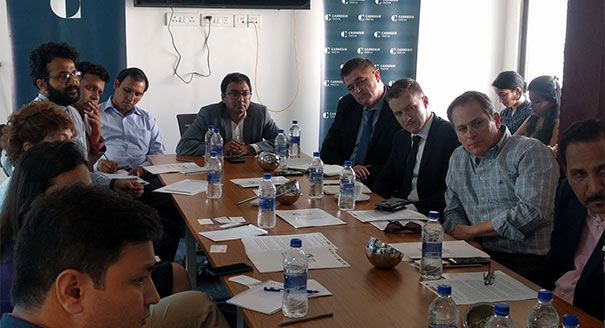Registration
You will receive an email confirming your registration.
The information and communication technology (ICT) sector has played an important role in India’s economic growth and the emergence of an informed citizenry. The Indian government has placed technology at the heart of India’s growth story, with emphasis on policies such as Digital India, Make in India, and Startup India. Carnegie India, in association with the Information Technology Industry Council (ITI), the U.S.-India Business Council, and the Telecommunications Industry Association (TIA), hosted a closed-door roundtable to critically evaluate both the successes and challenges with the Indian government’s technology vision, and to share perspectives on the ease of doing business (EoDB) in India’s ICT sector. The roundtable saw the attendance of leading stakeholders from industry associations, think tanks, technology companies, and media.
Event Highlights
- The World Bank’s EoDB Rankings: Participants noted that the World Bank’s 2017 EoDB rankings, in which India moved up by 30 spots from the previous year, should not be taken at face value. They remarked that apart from the Bank’s reliance on a survey confined to two cities, Mumbai and Delhi, the rankings also presented the real risk of “teaching to the test,” as demonstrated by the online construction permit system introduced in these cities just in time for the bank’s evaluation. Discussants stated that sector-specific studies, such as the ITI Global Benchmark Report to assess product safety regulations worldwide and their impact on EoDB, rank India at the very bottom after evaluating factors including international standards, predictability, transparency, and market surveillance.
- Unsatisfactory Policy Implementation and Enforcement: Participants stressed the need for a more consultative and open process of regulatory impact assessment, so that actual policy implementation is placed front and center of the debate on EoDB. Participants spoke about the compulsory registration requirement introduced in 2012, the implementation of which led to dissonance between Indian and global standards that caused delays in product launches as well as cancellation notices. Speakers explained that such regulatory hurdles impact Indian start-ups and manufacturers much more than their bigger global rivals, who can better absorb the operational costs mounted by them. A few participants struck a more positive note, pointing out the willingness of Indian governmental agencies in recent years to engage with stakeholders and understand the complexities of regulating the ICT sector. They insisted on an equally participative approach from industry and civil society stakeholders, rather than placing all blame at the bureaucracy’s doorstep.
- Closed-door Policies: Participants noted that policies geared toward enhancing domestic manufacturing, such as Make in India, require a more collaborative stance for multinationals to work more effectively with the local ecosystem, as well as consistency with other goals including the global competitiveness of Indian ICT firms. Participants broadly concurred that a highly insular import substitution strategy, cautioned against by the NITI Aayog in 2016, would be detrimental in the long run. They also noted that ill-defined notions of “digital colonization” were resulting in policy proposals to protect India’s digital economy from foreign players. They emphasized the need for more informed research on the ICT sector in India.
- Regulating the Digital Economy: Participants expressed concern over a recent trend among Indian policymakers to publicly support data localization. They opined that such a model of data sovereignty would neither be practical nor scalable. Instead, they proposed examining alternate models to facilitate the cross-border sharing of data for national security and law enforcement purposes. Participants agreed that the current Mutual Legal Assistance Treaty process for data sharing was ineffective and needed reexamination but emphasized the need for optimal cross-border data sharing models that were not overly restrictive of innovation. They pointed out that the Reserve Bank of India’s recent mandate to store the transaction data from payment systems and gateways in servers located in India represented ad-hoc policymaking with no regard to the interests of innovators or even the larger public. They further described their concerns with a data protection law along the lines of the European Union’s General Data Protection Regulation, given the weak state machinery to enforce such a regulation. They advocated a more co-regulatory approach with sufficient innovator incentives and suitably tailored penalties to enforce respect toward privacy and data security.
This event summary was prepared by R. Shashank Reddy, a research analyst at Carnegie India.
